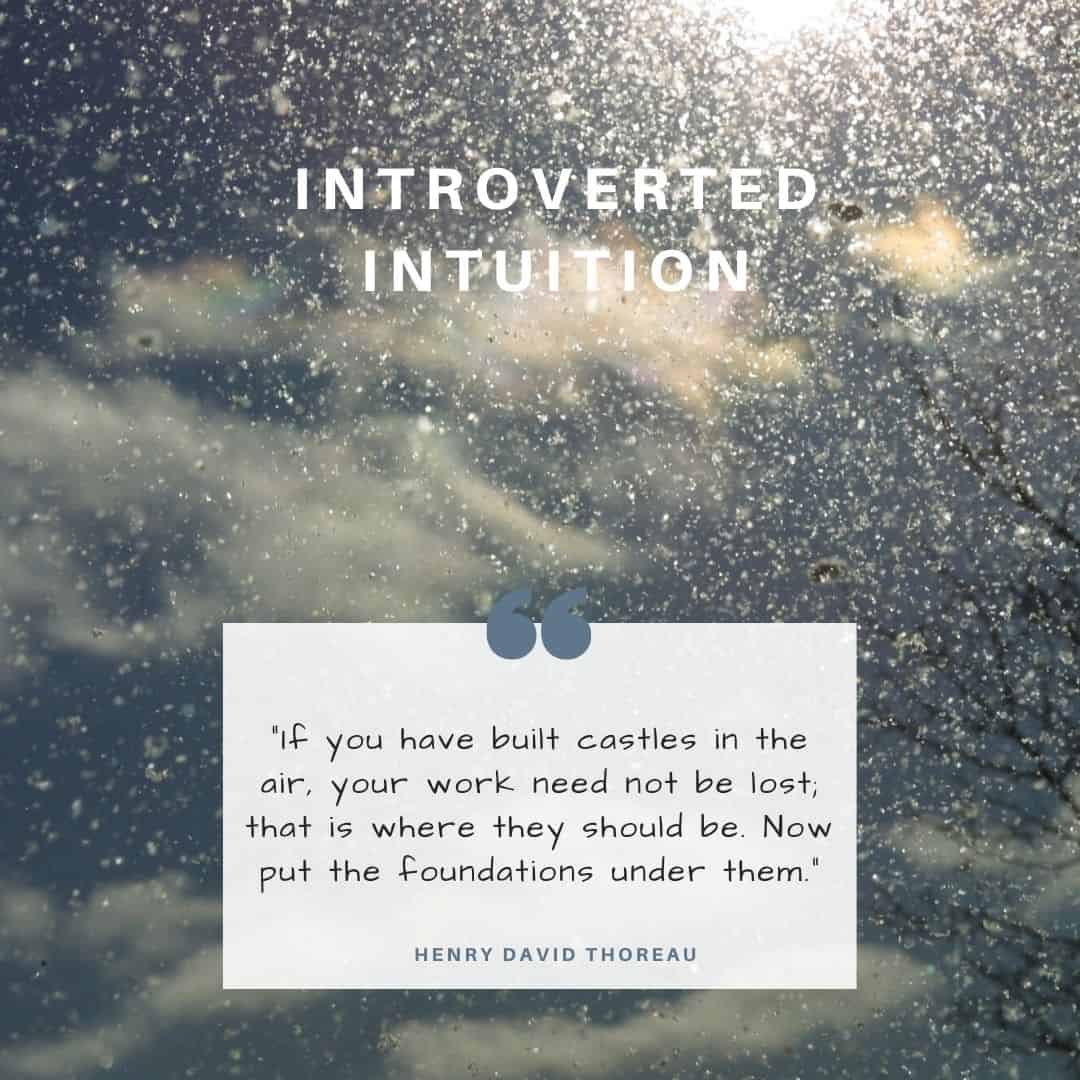You know that feeling when your brain quietly drops a truth bomb into your lap and then just… walks away? No fanfare, no proof, just a subtle nudge saying, “Hey, this thing you can’t logically explain? Yeah, it’s real.”
And you’re left sitting there, blinking into the void, wondering whether you’re a secret oracle or just overdue for a nap.


Welcome to the INFJ experience.
The problem is, most INFJs don’t trust that nudge. They’ve been conditioned to treat it like a glitch. An error message in a world that prefers its answers bullet-pointed and backed by peer-reviewed studies. So they smile, keep it to themselves, and wait for reality to catch up; usually while someone louder and less perceptive is explaining why their “feelings” are irrelevant.
But here’s the thing: INFJs are wired for these kinds of insights. Their brains are like long-range pattern detectors, quietly connecting dots while everyone else is too busy arguing over which dots are even worth noticing. And when they dismiss those insights, they’re betraying one of their most powerful tools.
Not sure what your personality type is? Take our new personality questionnaire!
The INFJ Superpower That Feels Like a Liability


Introverted Intuition (or Ni, if we’re being fancy) is a weird beast. It’s not loud. It doesn’t come with graphs or data sets. It doesn’t scream for attention like some extraverted functions do, or lay out its process step-by-step. Nope. Ni just quietly stitches together every random thing you’ve ever noticed, overheard, read, or half-felt into this eerie, fully-formed knowing that shows up unannounced.
Dr. John Beebe, a psychoanalyst and Jungian expert, calls one of the gifts of Introverted Intuition “divining.” He went on to say, “‘Divining’ has a double meaning, it is not only seeing in what direction the future is bending. It is also describing the divine purpose hidden in a developing situation.”
With introverted intuition, it feels like your brain’s been running a background process this whole time, sifting through the fine print of existence while you were busy folding laundry. And then, mid-socks, it whispers, “Hey… that person’s about to self-destruct. You should probably do something.”
But instead of trusting that, most INFJs freeze. Because you know it sounds weird. You can’t explain how you know. You didn’t decide to analyze it. It’s just there, like an unsolicited memo from your subconscious that nobody asked for but should probably read.
In coaching sessions, I’ve seen this dance play out so many times. An INFJ will come to me and say, “I keep getting this feeling that something’s wrong, but I don’t know why. I’m probably just overthinking it.”
No. You’re not. You’re under-believing yourself.
The World Doesn’t Always Get It (But That Doesn’t Mean You’re Wrong)
You know who gets this? Bruno. Yeah, that Bruno. The one we don’t talk about. Poor guy spent his entire life in the walls of his own house because he had the audacity to notice things. He saw cracks forming before anyone else did. He warned people. He tried to help. And what did he get in return? Exile. Gaslighting. A catchy musical number that doubles as a psychological case study in how society treats certain intuitives.
Bruno is every INFJ who’s ever spoken up about a brewing disaster only to be shushed, side-eyed, or outright blamed when it all went to hell; like being the weather forecaster who gets scolded for “manifesting” the storm.
This is what happens when a world obsessed with surface-level logic encounters an INFJ’s deep, abstract pattern recognition. The INFJ sees the ripple effects before anyone else even acknowledges the pebble. But because their insights arrive fully-formed, without a convenient step-by-step slideshow of “how I got here,” people dismiss them as paranoia, melodrama, or emotional fluff.
And that dismissal really hurts. It teaches INFJs to shrink themselves. To couch their insights in endless disclaimers. To start every sentence with “I might be wrong, but…” even when they know they’re not.
But here’s the thing: Your brain is just faster at seeing the web of cause-and-effect than most people’s. It’s not a flaw. It’s not “weird.” It’s your superpower. And if you keep waiting for everyone else to see what you see, you’re going to spend a lot of your life holed up in the proverbial walls, whispering “I called it” into the darkness.
The world has done a bang-up job of teaching INFJs to distrust their own minds because their insights don’t come with a neon sign that says “SCIENCE-APPROVED.” But just because something’s quiet doesn’t mean it’s not incredibly powerful.
Your brain is working. It’s just working in a language most people never learned to hear.
The Cost of Ignoring Your Intuition
Here’s the part nobody likes to admit: Every time you ignore your intuition because it feels “too weird” or “too vague,” you pay for it. Maybe not immediately. Ignoring your gut is sneaky like that. It doesn’t bite you right away; instead, it waits. It lets you settle into that nice, cozy sense of “being reasonable” while quietly setting up a slow-motion disaster in the background.
And then one day, you wake up knee-deep in a job that’s draining the life out of you, a relationship where you feel like a free therapist, or a social circle where you can’t say anything real because “you’re so intense.”
It starts small. You tell yourself you’re overthinking. You let someone else’s louder, more “logical” opinion override your quiet knowing. You go with the path that “makes sense on paper,” even though your gut is sending out red-alert signals.
And each time you do that, something cracks. It probably feels small at first, but overtime it adds up.
I’ve seen INFJs come to me after years of swallowing their insights and dimming their own vision because they didn’t want to rock the boat. By the time they’re sitting in front of me, they’re burnt out, disillusioned, and vaguely furious at themselves without knowing why.
Sadly, it’s because they’ve spent years betraying their own mind.
There’s a specific kind of existential exhaustion that comes from knowing you saw the signs, ignored them to be “nice” or “sensible,” and now you’re living in the wreckage you could have avoided. And the worst part? You’ll still find a way to blame yourself for it.
“Oh, I should’ve spoken up.”
“I should’ve trusted my gut.”
“I should’ve been more convincing.”
No, you should’ve been believed the first time.
But since the world is slow to catch up, it’s up to you to believe yourself first.
How to Tell the Difference Between an Insight and Anxiety
Let’s address the elephant in the room—the one pacing in your head at 3am, muttering, “But what if I’m just being anxious and dramatic?” Because yeah, INFJs live in a constant tug-of-war between “I know things” and “I’m probably just catastrophizing.”
The problem is, anxiety masquerades as intuition. It shows up uninvited, puts on intuition’s jacket, and pretends it belongs. Meanwhile, your actual intuitive insight is sitting quietly in the corner, sipping tea, waiting for you to notice it hasn’t been screaming, it’s been observing.
Here’s the difference I’ve seen over and over in my clients:
- Anxiety feels like a frantic squirrel ransacking your brain, knocking over thoughts, flipping tables, and demanding immediate action. It’s loud, chaotic, and drenched in “what ifs.”
- Intuition feels like a quiet, persistent knowing that just won’t go away. It’s not panicky or scattered. It just taps you on the shoulder, over and over, like, “Hey. This thing. Pay attention.”
One INFJ client described it perfectly: “When it’s anxiety, it’s like my brain is on fire and I’m trying to put it out with gasoline. But when it’s intuition, it feels like a still, small voice I can’t shake off, even when everything else seems fine.”
So if your “insight” is accompanied by a sudden spike in heart rate, doomsday scenarios, and an urgent need to fix everything right now, that’s anxiety, my friend. It’s a smoke alarm that goes off every time you fry bacon.
But if it’s calm, subtle, and keeps coming back in quiet moments, while you’re showering, while you’re walking, while you’re trying to focus on anything else, that’s your intuition, doing its thing. It doesn’t need you to act immediately. It just needs you to listen.
The trick is to give your brain space. Write it down. Observe. Intuition functions best in quiet reflection; anxiety thrives in chaos. The more stillness you create, the easier it’ll be to tell which one you’re dealing with.
Small Ways to Start Trusting Your Intuition Daily
Look, I’m not asking you to quit your job, dump your friends, and run off to join an underground society of oracles (though, admit it, you’ve thought about it). Trusting your intuition doesn’t have to be a grand, life-altering leap off a philosophical cliff. It starts small. Quiet. Subtle. The same way your insights tend to show up.
Here are a few micro-rebellions you can start with:
1. Follow a Hunch in a Low-Stakes Situation
You don’t have to predict the collapse of society by Tuesday. Start with something harmless. Take a different route home because it “feels right.” Pick up that random book you keep noticing, even if it’s not your usual genre. Message that person who’s been on your mind for no reason other than a gut nudge. Tiny acts of intuition-trusting that won’t derail your life if you’re wrong, but will build self-trust when you’re right.
2. Keep a “Weird Insight” Journal
Every time you get a hunch, a gut feeling, or a “this probably means nothing but…” thought, write it down. No filtering. No justifying. Just a log of those subtle nudges. Over time, you’ll start noticing patterns. You’ll see how often your brain was quietly right while you were too busy second-guessing it. And there’s something deeply satisfying about flipping back through your notebook and realizing you called it—again.
3. Practice Sitting With It
INFJs have a tendency to either act immediately (to quiet the discomfort) or shove the insight aside (to avoid being “that person” again). Instead, try just sitting with it. Let the insight breathe. Let it simmer. You don’t have to do anything yet. Give it space to marinate in your brain without pressure.
4. Listen When Something Feels Off—Even If You Don’t Know Why
If you’re in a conversation and suddenly feel a shift—like the air got heavier, or someone’s words don’t match their energy—don’t dismiss it. You don’t need to confront them. Just note it. Let it register. That’s your intuition picking up micro-signals your conscious mind hasn’t fully processed yet.
5. Create Quiet
Intuition doesn’t like to compete with noise. It’s not going to shout over your endless podcast queue or elbow through a TikTok scrollathon. It prefers the gaps—the moments when your mind is allowed to wander. Go for a walk without headphones. Take a shower and let your thoughts roam. Give your intuition a blank canvas, and you’ll be surprised what shows up.
The goal here isn’t to transform overnight into some mystical guru who’s never wrong. It’s to rebuild the trust you’ve been trained to erode. One small, quiet act at a time.
Embracing Your Inner Seer: What Happens When You Trust It?
Here’s what nobody tells you: Trusting your intuition doesn’t make life easier. It makes life clearer.
Easier would be nice, sure. But clarity is the difference between sleepwalking through choices that feel “acceptable” and consciously stepping into a life that actually fits your wiring, even if it makes other people uncomfortable.
When INFJs start trusting their insights, something shifts. I’ve seen it. The apologetic disclaimers start to disappear. The second-guessing gets quieter. They stop waiting for permission slips from people who are still playing catch-up.
And what shows up in its place? A quiet kind of confidence. The kind that says, “I know what I know. You’ll see.”
Your Relationships Shift
When you trust your insights, you stop bending over backwards to prove yourself to people who were never going to listen anyway. You start gravitating toward those who value your depth, your perceptions, your ability to read between the lines. You become a trusted advisor, not a background observer.
Your Work Aligns
You stop wasting time in jobs that drain you because they “made sense on paper.” You start carving out paths that feel meaningful, even if they’re unconventional. You begin to realize that your ability to synthesize complexity into clarity is a superpower in any field that values depth over noise.
You Reconnect with Yourself
When you stop overriding your intuition, you stop betraying yourself. You begin to feel… aligned. Like you’re no longer living on someone else’s timeline, no longer contorting yourself to fit into spaces you’ve outgrown. That constant, low-grade hum of “something’s not right” starts to fade because you’re actually listening now.
The Ripple Effect
INFJs are built to influence quietly but deeply. When you trust your insights, you start planting seeds that grow in places you’ll never see. You become the person who shifts conversations, who helps people see themselves more clearly, who notices the thing that changes the entire trajectory of a situation, even if no one realizes it at the time.
But none of that happens if you keep muting yourself. The world doesn’t need you to be louder. It needs you to be steadier in what you already know.
Stop Waiting for Permission
Here’s the brutal truth: No one’s going to come tap you on the shoulder and say, “Hey, it’s safe now. You can trust yourself.” That moment doesn’t exist. You’re the one who has to decide it’s time.
You don’t need external validation to believe your own brain.
You don’t need a panel of experts to approve your gut feelings.
You just need to stop treating your insights like accidental glitches and start treating them like the quiet superpower they’ve always been.
So here’s your challenge: What’s one intuitive nudge you’ve been ignoring?
It’s time to listen.
Other Articles You Might Enjoy:
This post is for every INFJ who can envision the future but can’t make it through their inbox. If that sounds like you, you’re not broken — just built differently…
If you’re an INFJ, chances are you’ve had this moment: You’re sitting on the couch, nodding empathetically while someone pours their heart out—trauma, heartbreak, existential dread, the whole messy human…
There’s something sacred about the blank page. For Idealists — the NF personality types in the Myers-Briggs® system — journaling can be a lifeline. A ritual. A private portal into…
If you’re an INFJ, flow isn’t about pushing through external obstacles or getting things done at lightning speed. It’s about tuning into your own mind, following your insights, and letting…
INFJs are known for their depth, empathy, and borderline supernatural ability to read people. They’re the ones who can sense your mood before you’ve even opened your mouth, who can…
When you think of INFJs, one of the last things that will come to mind is someone tossing over tables and screaming at other people. The “Mystics” are sensitive and…





